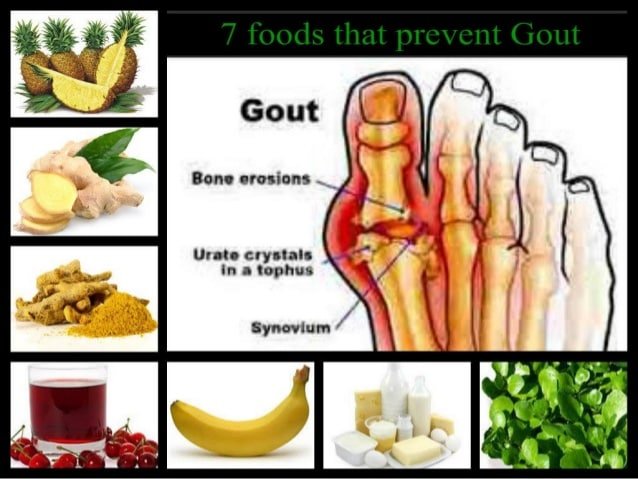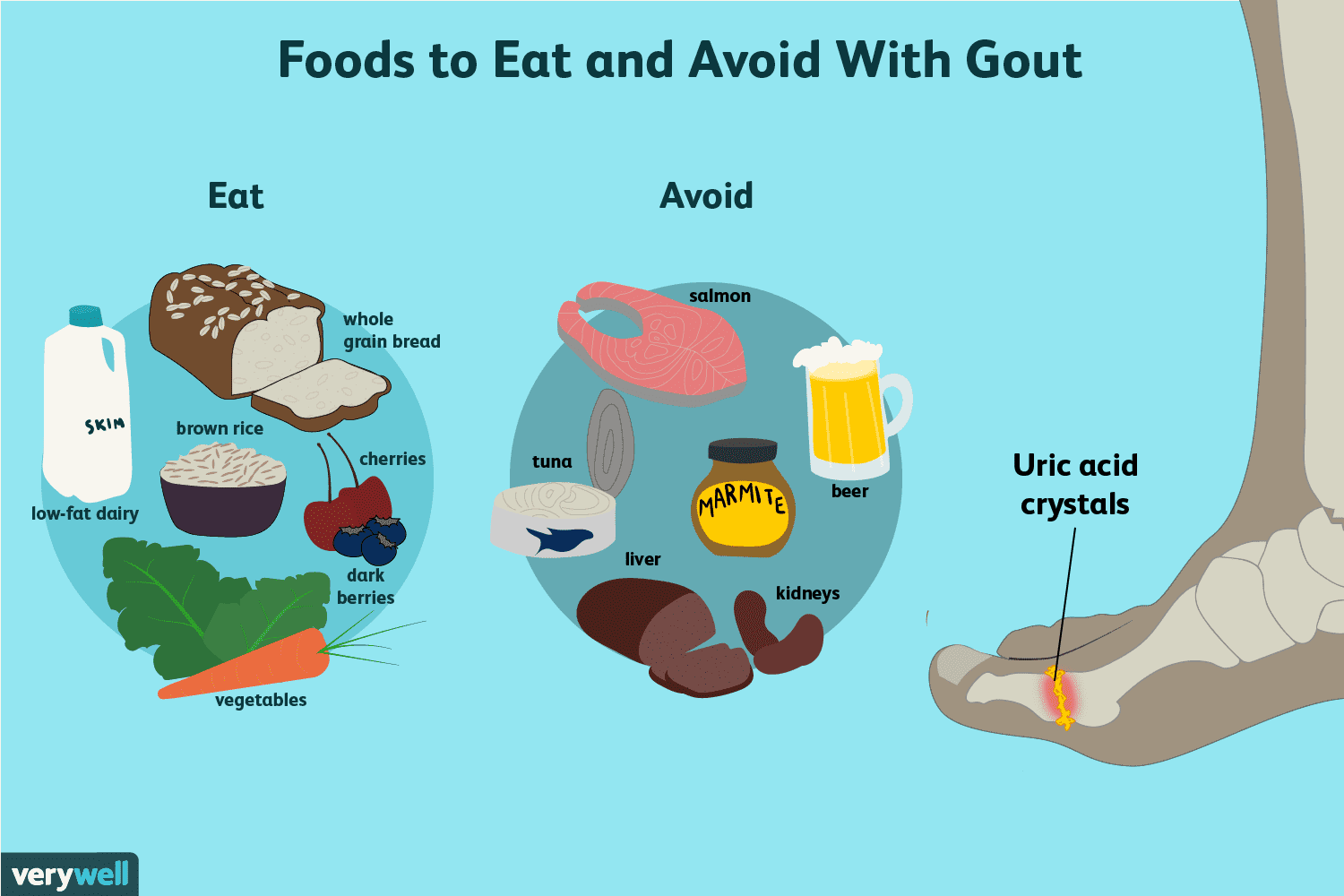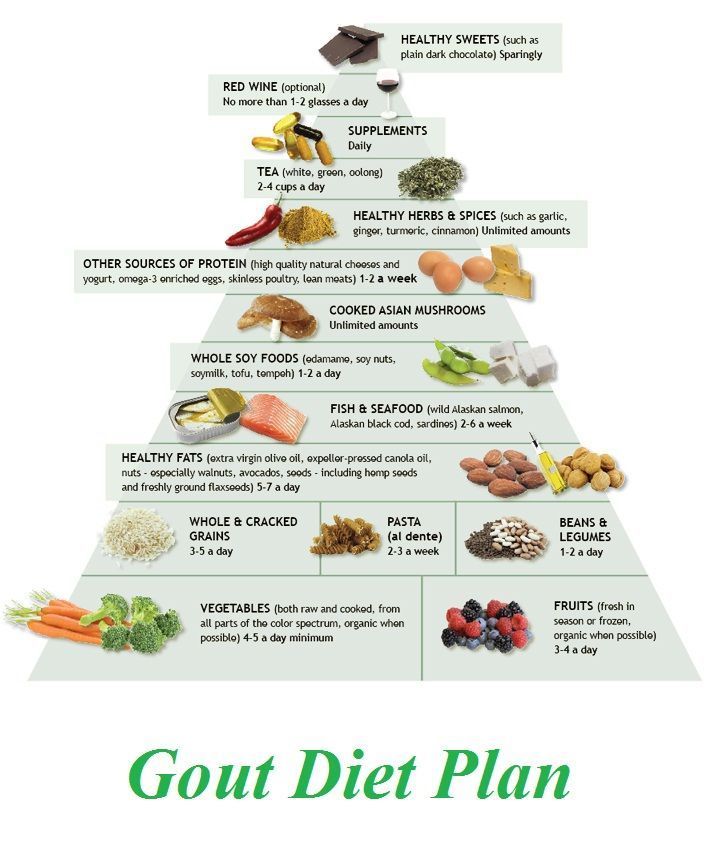What Foods To Avoid
Many of the foods you want to avoid are meats and seafood. Meats such as chicken, pork, beef, or lamb are usually okay in moderation however, if you find they cause symptoms you will want to avoid them altogether. Salmon, as part of a gout diet, is also usually tolerated well in moderation.
- Yeast:beer, nutritional yeast, large amounts of bread, others
- Game meats: venison, veal, bison, others
- Organ meats: liver, tongue, tripe, others
- Fish: including sardines and anchovies
- Other seafood: shellfish, roe, others
- Sugary drinks: sodas, fruit juice, others
- Sugar substances: honey, nectar, high-fructose corn syrup, others
Gout Diet: Dos And Donts
Maintaining a balanced diet, low in uric acid, is critical for lowering the risk of a gout attack. Learn which foods and beverages you should eat and which ones to avoid.
1. What You Eat and Drink Matters
2. DO: Drink Water
3. DONT: Drink Beer
4. DO: Drink Milk
5. DONT: Drink Liquor
6. DO: Drink Coffee
7. DONT: Drink Soda
8. Do: Eat Citrus
9. DONT: Eat Organ Meats
10. DO: Eat Vegetable Proteins
11. DONT: Eat Certain Seafood
12. DO: Eat Cherries
Nutrition
Gout Signs And Symptoms
The signs and symptoms of gout almost always occur suddenly, and often at night. Gout is characterized by sudden, severe attacks of pain, swelling, redness and tenderness in one or more joints, most often in your big toe.
The symptoms of gout include:
- Intense pain in a joint, which can be quite severe. Gout usually affects your big toe, but it can occur in any joint. Other commonly affected joints include the ankles, knees, elbows, wrists and fingers. The pain is likely to be most severe within the first four to 12 hours after it begins.
- Lingering discomfort. After the most severe pain subsides, some joint discomfort may last from a few days to a few weeks. Later attacks are likely to last longer and affect more joints.
- Inflammation and redness. The affected joint or joints become swollen, tender, warm and red.
- Restricted movement of the joint. As gout progresses, you may not be able to move your joints normally.
Signs of gout include
In over three quarters of people with gout, their first ever episode tends to be in the big toe. The typical signs include:
- Severe pain in the joint
- Swollen joint
- Red or hot joint
An attack of gout can occur suddenly, often waking you up in the middle of the night with the sensation that your big toe is on fire. The affected joint is hot, swollen and so tender that even the weight of the bedsheet on it may seem intolerable. These symptoms usually develop rapidly and can last for 1 to 2 weeks.
Recommended Reading: Best Natural Supplements For Gout
Sodas And Sugary Drinks
Sodas and sugary drinks are considered empty-calorie foods, because they contain no beneficial nutrients while contributing a lot of calories to your diet.
For example, a 12-ounce can of cola contains about 150 calories and 40 grams, or about 9.5 teaspoons, of added sugars. In addition, sugar-sweetened beverages have been associated with an increased risk of heart disease, type 2 diabetes, weight gain, and dental caries.
Avoid Sugary Beverages And Added Sugars

Limit or avoid sugar-sweetened foods, candies, and naturally sweet fruit juices. Fruit juices and sodas may contain added sugars like fructose, which you want to reduce on a gout diet. High-fructose foods or beverages sweetened with high-fructose corn syrup are linked to high blood uric acid levels and an increased risk of developing gout.
Don’t Miss: How To Treat Gout In Foot And Ankle
Processed Foods And Refined Carbs
The modern Western diet is often high in processed foods and refined carbohydrates. In addition, processed foods and refined carbohydrates have been linked to an increased risk of type 2 diabetes, heart disease, and weight gain.
A 2017 study looked at gout incidence in people who followed either a Western diet or the Dietary Approaches to Stop Hypertension diet. The researcher found the DASH diet was associated with a lower risk of gout, whereas the Western diet was associated with a higher risk of gout.
To help prevent gout symptoms, its best to limit highly processed foods and beverages and foods high in refined carbohydrates, such as sweets, baked goods and pastries, chips, crackers, cookies, candies, soda, ice cream, white breads, and some pre-made frozen meals.
Eating highly processed foods and refined carbohydrates in moderation will not only help with your gout, but your overall health as well.
How Does Food Affect Gout
If you have gout, certain foods may trigger an attack by raising your uric acid levels.
Trigger foods are commonly high in purines, a substance found naturally in foods. When you digest purines, your body makes uric acid as a waste product .
This is not a concern for healthy people, as they efficiently remove excess uric acid from the body.
However, people with gout cant efficiently remove excess uric acid. Thus, a high-purine diet may let uric acid accumulate and cause a gout attack (
10 ).
Foods that commonly trigger gout attacks include organ meats, red meats, seafood, alcohol and beer. They contain a moderate-to-high amount of purines .
However, there is one exception to this rule. Research shows that high-purine vegetables do not trigger gout attacks .
And interestingly, fructose and sugar-sweetened beverages can increase the risk of gout and gout attacks, even though theyre not purine-rich (
16 ).
For instance, a study including over 125,000 participants found that people who consumed the most fructose had a 62% higher risk of developing gout .
On the other hand, research shows that low-fat dairy products, soy products and vitamin C supplements may help prevent gout attacks by reducing blood uric acid levels (
Summary: Foods can either raise or lower your uric acid levels, depending on their purine content. However, fructose can raise your uric acid levels even though it is not purine-rich.
Don’t Miss: How To Lower Uric Acid For Gout
Gout Diet: Foods To Eat And Foods To Avoid With Gout
If you have gout, you know how painful it can be. Odds are,youre stumbling around during a gout flareup because the condition probablyaffects your big toe. Such a little digit does a big job of helping you moveand balance yourself. Often, when your toe hurts, you can be prettysignificantly disabled.
Gout is a form of arthritis that occurs whenyour body either makes too much uric acid or cant get rid of it. Sometimes thefoods you eat can influence whether your gout flares up. You dont want to makethings harder for your body, so it pays to know what to eat and what to avoid.
This holiday season, treat your big toeand therest of your bodyright. Make sure to pass on high-purine foods and insteadpile your plate with foods that may reduce the likelihood of a gout attack.
What Is Normal Uric Acid Level
- Normal values range between 3.5 to 7.2 milligrams per deciliter .
- Normal urine uric acid levels range from 250 to 750 milligrams per 24 hours .
Normal value ranges may vary slightly among different laboratories. Some labs use different measurements or test different samples. Normal serum urate levels do not exclude the diagnosis of gout. Talk to your doctor about the meaning of your specific test results.
Also Check: What Vitamins To Take To Prevent Gout
Theres More To Gout Than Too Much Uric Acid
Before we dive into the list of foods to avoid with gout, its important to get to the root of what causes too much uric acid and who is at a higher risk.
First, no one is exempt from getting gout. Some people are just more sensitive to purine-rich foods and drinks and thus churn out more uric acid. Genes can play a significant role, so if you have a relative with gout, you might be at a higher risk.
Second, putting on weight through adulthood is associated with a higher risk of gout, according to research published in 2021 in the journal Arthritis Research and Therapy.
In an earlier study published in Arthritis and Rheumatology, overweight people were 85 percent more likely to have higher uric acid levels than people at a healthy weight.
Risk Factors For Developing Gout
Youre more likely to develop gout if you have high levels of uric acid in your body. Factors that increase the uric acid level in your body include:
Gout is more common in men than in women, and among women its more common after menopause. Its more likely to occur in older people, but can affect anyone.
It can also affect people with certain types of blood disorder and people in treatment for cancer.
Recommended Reading: Can Gout Be Cured Forever
How Is Gout Affected By Diet
Gout is a type of arthritis that is associated with elevated levels of uric acid in the blood. High levels of uric acid can cause crystals to form in the joints, causing pain and swelling. Uric acid is a normal waste product formed from the breakdown of food, particularly compounds called purines. It is believed that lowering uric acid levels through small changes in your diet may help reduce the chance of future gout attacks.
A healthy, balanced diet may help reduce the risk of gout attacks.
Plenty Of Fruit And Vegetables

The recommendation is five portions per day, but try to include as many as possible. Bulking out meals, such as Bolognese, casseroles and stews with vegetables can help to reduce the meat content. Fruit and vegetables contain vitamin C. Although evidence is unclear, high intakes of vitamin C may help to reduce uric acid levels in the blood. Cherries may be particularly useful to include in the diet, as they have also been found to reduce levels of uric acid in the blood.
Also Check: Foods High In Uric Acid Causing Gout
Health And Food Safety Issues
The offal of certain animals is unsafe to consume:
- The internal organs of the fugupufferfish are highly toxicin Japan, fugu can only be prepared by trained master chefs, working under extremely strict regulations, sanitary conditions, and licensing. Even a residual portion of fugu toxin can be fatal.
- The liver of the polar bear is unsafe to eat because it is very high in vitamin A and can cause hypervitaminosis A, a dangerous disorder. This has been recognized since at least 1597 when Gerrit de Veer wrote in his diary that, while taking refuge in the winter in , he and his men became gravely ill after eating polar-bear liver. Seal liver is similarly toxic, as is dog liver.
- Some animal intestines are very high in coliformbacteria and need to be washed and cooked thoroughly to be safe for eating.
- Nervous system tissue can be contaminated with TSEprions, which cause bovine spongiform encephalopathy in some jurisdictions these offal are classified as specified risk materials and are subject to special regulations.
- Offal very high in purines can precipitate an acute attack of gout in someone with the condition.
- Certain types of offal, including kidneys, stomach, intestines, heart, tongue, and liver, can be very high in cholesterol and saturated fats.
- The practice of feeding raw offal to dogs on farms and ranches can spread echinococcosis, a potentially fatal parasitic disease of animals, including humans.
High Purine Vegetables Are Ok
Some vegetables and plant foods, such as peas, beans, lentils, spinach, mushrooms, oats, and cauliflower, are high in purines. However, several studies have shown that they do not increase the risk of gout.
In fact, the opposite seems to be true, with a vegetable-rich diet being associated with a lower risk of gout compared with the lower consumption of vegetables. Therefore, you do not need to limit or avoid any vegetables on a gout-friendly diet.
Read Also: What Are The Remedies For Gout
Does Fructose Cause Gout
Fructose is a sugar that is found in fruits and vegetables. It is also found in high levels in foods sweetened with corn syrup, such as bread, cereal, soft drinks and fruit juices. An American study found that men who drank five to six servings of fructose-sweetened soft drinks per week were more likely to have gout. However there is no research showing that fructose actually causes gout. Cutting down the amount of food artificially sweetened with high fructose corn syrup may be beneficial for your overall health. However naturally occurring fructose in fruit and vegetables also provides general health benefits and should not be completely avoided without advice from your doctor or dietitian.
What Foods Are Good For Gout
Dietary management of gout focuses on reducing the amount of uric acid in the system and attaining and maintaining a healthy body weight.
Foods that may help keep gout in check are
- Fresh fruits and vegetables such as berries, oranges, bell pepper and pineapple
- Low-fat dairy products, such as yogurt and skimmed milk
- Nuts including nut butters such as almond butter and peanut butter
- Whole grains
- Potatoes, rice, whole-grain bread and pasta
- Eggs
- Oils such as olive oil
- Flax and other seeds
Recommended Reading: Gout In Foot Foods To Avoid
Should I Cut Out Purine
There is very little scientific proof that avoiding the purine-rich foods listed above can successfully reduce gout attacks. You may miss out on important nutrients and vitamins by completely cutting these foods from your diet.
If you notice certain foods trigger your gout attacks, you may benefit from cutting down the amounts of those foods in your diet. However not all purine-rich foods are thought to cause gout. For example, a number of vegetables are also rich in purines but appear less likely to cause gout than diets containing meat and shellfish.
Dairy foods, which can contain purines, actually appear to lower the risk of gout. For most people with gout, a healthy balanced diet is all that is needed, alongside medicines to reduce uric acid levels. Most people taking medicines to reduce uric acid levels find they can still eat purine-rich foods without attacks of gout by being careful with the quantity they eat.
Red Meat And Organ Meat
Red meat and organ meats are high in purines. Eating these foods increases the uric acid levels in the blood and the risk of gout and gout attacks.
Keep your red meat and organ meats intake low. Chicken has moderate amounts of purines, and therefore should be eaten in moderation.
Protein is important for the body, and though you may need to limit protein from some animal sources, you can still get protein from other sources. Low-fat dairy seems to decrease the risk of gout and is a good source of protein in the diet. Other protein foods you can eat include eggs, nuts and nut butters, beans, and tofu.
Meats to avoid:
- Beef, pork, and chicken livers
- Other organ meats, such as kidney or heart
- Wild game
- Red meat
- Poultry
- Processed meats, such as salami and prosciutto
Recommended Reading: What Can I Eat During A Gout Attack
Avoid Sweets And Sodas
Unlike fruit with its natural sugar, artificial sugars are widely recognized as gout flare dangers. Consuming too many sugary sodas has been found to provoke attacks, but no association has been found with artificially sweetened sodas. Other foods loaded with high-fructose corn syrup can also bring on gout pain.
Foods To Avoid With Gout

Foods to avoid with Gout are the foods which contain amounts of purine. The amount of purine in foods you generally eat can contain up to 1000 mg of purine. This amount of purine is dangerous for a gout patient and can aggravate his/her gout pain. You need to watch out your intake of purine to reduce the amount of uric acid in your body.
Recommended Reading: Are Lentils Good For Gout
Gout And Diet: Foods And Drinks To Avoid
What causes gout, what are purines and are there any natural food remedies for the condition? Dietitian Emer Delaney explains which foods to eat and avoid.
Gout is an arthritic condition that can cause sudden, severe joint pain. If you are experiencing symptoms of gout, the NHS recommends that you see a doctor for treatment during an attack and to help prevent further attacks.
We asked Emer Delaney, a dietitian who has worked in some of Londons top teaching hospitals, to explain how diet and lifestyle can affect the condition.
Dietary Supplements For Gout Management And Prevention
Talk to your doctor about any supplements or vitamins you take or may want to take. Supplements and other remedies may interfere with medication.
Vitamin C supplements are sometimes recommended for people with gout.
One study found that taking 500 mg of vitamin C per day had a mild uric-acidlowering effect. Yet its not clear whether vitamin C helps relieve gout symptoms.
A 2013 study in the journal Arthritis and Rheumatism showed that supplementing with 500 mg of vitamin C for eight weeks did not significantly lower uric acid levels in patients with gout.
Read Also: Gout In My Big Toe Joint
An Overview Of Dietary Approaches To Manage And Prevent Gout
The main principles of a gout diet are usually the same as those of any healthy, balanced diet.
They include:
- If youre overweight, reduce the number of calories you consume.
- Choose unrefined carbohydrates like fruits, vegetables, and whole grains.
- Limit your intake of sugar-sweetened beverages and foods.
- Limit your intake of organ meats .
- Cut back on saturated fats.